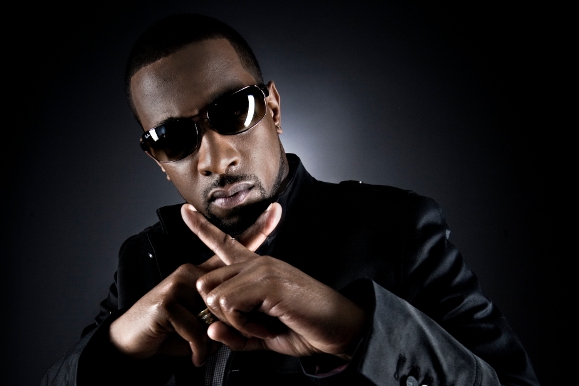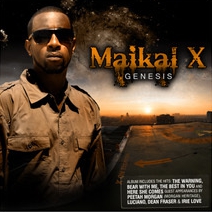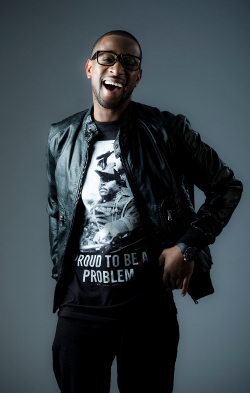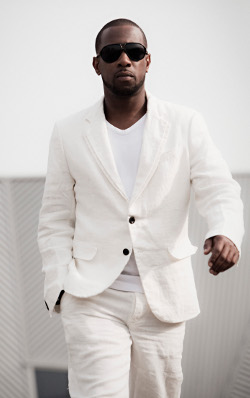Articles about reggae music, reviews, interviews, reports and more...
Interview: Maikal X
- Home
- Articles
- Interviews
- Interview: Maikal X

Interview: Maikal X
"Whenever I stepped out of my house I was in Holland but when I went back inside that was the Caribbean"
Sampler
"Let me just finish helping my daughter with her homework", is Dutch reggae star Maikal X’s initial reply to an interview request. It’s a response that indicates that - despite blowing up internationally with his first single The Best In You, recording with Jamaica’s Don Corleon, and his Rock’N’Vibes album 'Genesis' being picked by VP records, all in a short space of time - Maikal remains a regular down-to-earth Dad. Born Michael Parkinson to a British-Guyanese father and Curaçaolenian mother, he shot to fame in 1998 as Shyrock in Platinum-selling Reggae-Hip Hop group Postmen before departing, dissatisfied with industry politics, in 2004. But a new door opened when he decided to mc on Amsterdam’s now-celebrated Jamrock sound system and he began to consider a new moniker and solo reggae career. He’s actually the second Rock’N’Vibes artist to have his album re-released by the US giant, following his stablemate Ziggi, showing the formidable strength of Dutch reggae right now. Once the homework was out of the way, Maikal spoke to Angus Taylor with enthusiasm about his unusual upbringing, his sudden success, and his all important links to the UK…

I know you wanted Genesis to go international. It must feel good to have achieved your aim?
Yes, especially with record sales how they are. There aren't many record companies left so to get a chance to release my project on an international level is perfect. Whenever I make music I think the world is my canvas but you've got to be realistic. I know how the business works and half the time it's not even about the music, it's the relations you keep. Of course, I wanted everyone to hear it but I didn't expect it to happen this soon. I thought maybe it would be the next album.  I released The Best In You three years ago, and off that song I got introduced to Don Corleon and did Bear With Me on the Changes rhythm. So I was just coming out with my first tune and already I had one of the biggest reggae producers linking me, which is scary because I haven’t even made my first steps yet! But everything for a reason and I know every artist wants this. And being from a small country like Holland which is not really known for music around the world, it’s a blessing. The UK is the hardest part of Europe for a Dutch artist to reach. The UK is like the threshold because if you’re respected in the UK you can go to America.
I released The Best In You three years ago, and off that song I got introduced to Don Corleon and did Bear With Me on the Changes rhythm. So I was just coming out with my first tune and already I had one of the biggest reggae producers linking me, which is scary because I haven’t even made my first steps yet! But everything for a reason and I know every artist wants this. And being from a small country like Holland which is not really known for music around the world, it’s a blessing. The UK is the hardest part of Europe for a Dutch artist to reach. The UK is like the threshold because if you’re respected in the UK you can go to America.
You have links to the UK through your father. Has that helped you become the artist you are today?
My dad is from British Guyana but he lived in the UK for 35 years before he moved to Holland. Most of my dad’s side of the family who don’t live in British Guyana or America are living in England. So every summer vacation I could I would jump on the boat and stay with my uncles near Liverpool Street or with my friends in Plaistow and Hackney. So my relationship with England is very close. I have a British passport even though I was born in Holland. My uncles used to have illegal clubs in England called Shubeens and going to them and seeing the sound system culture put the spark in me from young.
 My uncles used to have illegal clubs in England and seeing the sound system culture put the spark in me from young
My uncles used to have illegal clubs in England and seeing the sound system culture put the spark in me from young
What are your favourite memories of music in England as a child?
I remember the early hip hop stages in England – being in Covent Garden and watching the break dancers, going to the Tabernacle in Ladbroke Grove as a young kid aged 11-13 to watch shows. I wasn’t even allowed in those clubs but somehow I’d always get in! I remember going to [Notting Hill] Carnival back in the 80s and watching people set up the big speakers and play for thousands of people. We never had that in Holland so all I know about reggae and sound system culture was what I learned in England as a youth. Of course as I grew I realized there are sound systems here too but the way it’s cemented into everyday life in England is not like that in Holland. Reggae is nothing special in England because every youth – white or black – has reggae in his blood because it’s been there for years. I had two uncles who used to travel with Steel Pulse, a light-man and a roadie. So whenever Steel Pulse had a show in Holland they would come to my parents house and eat our food and I would get free tickets and T Shirts from the tour! I’m a hip hop youth but my first album is a reggae album – and that’s why!
Your father is from Guyana and your mother from Curaçao. How have they influenced your life and work?
Through colonial ties most black youths growing up in Holland were either from Surinam or from Curacao but my dad was from British Guyana so I was always kind of an outcast. I wasn’t Surinamese but I wasn’t fully Curacao and in my house we spoke English. I had a mother from Curacao and a father who watched BBC on TV every day so I grew up with three languages being spoken in the house. It felt like whenever I stepped out of my house I was in Holland but when I went back inside that was the Caribbean. I never knew any Guyanese people in Holland so I grew up thinking I was the only one. When I told people I was from Guyana most people didn’t know where it was. But in England it was totally different because there you have Jamaicans, Guyanese, Trinidadians, Nigerians - everything mix up! In 1980s Holland it was more segregated – the Surinam stuck with the Surinam, the Curaçaolenians with the Curaçaolenians. I think England is way more advanced in dealing with ethnicity than other countries in Europe.
 I think England is way more advanced in dealing with ethnicity than other countries in Europe
I think England is way more advanced in dealing with ethnicity than other countries in Europe
You got involved in the hip hop scene at a young age as a dancer. What drew you there?
Every generation has its music and hip hop was mine. I remember standing on the balcony and watching the big boys in my neighbourhood break dance. I would want to go downstairs too and my mother would say no! I grew up in the middle of the hip hop culture when the influences from America came across the water from the Rocksteady Crew.  Also from going to England in the 80s and meeting people like Monie Love, DJ Pogo, MC Mell’O’, Demon Boyz and London Posse. I grew up on them and I used to bring that music back to Holland where no one had heard of it.
Also from going to England in the 80s and meeting people like Monie Love, DJ Pogo, MC Mell’O’, Demon Boyz and London Posse. I grew up on them and I used to bring that music back to Holland where no one had heard of it.
When did you decide to be a singer and not a rapper?
When I joined Postmen there was already a rapper in the band so it didn’t make sense for me to rap even though I could. I always used to sing but secretly because I was like, “Nah, singing ain’t cool” as everyone was rapping. But after joining Postmen and developing it I saw there was way more for me in singing.
You’re a soulful singer but you’re also a lyricist. Was that what hip hop gave you?
My interest in lyricism came from hip hop – point blank. I’m a rapper that started singing but I never sang like a traditional singer. I sang in rhyme form as I would write my raps so people would hear me sing rhythmically and say, “You’re different!” I didn’t know any better. Now I want to learn to play an instrument for my development.
I hear a lot of Dennis Brown in your voice. Who were the singers you admired when growing up?
British artists like Steel Pulse and Aswad, but also Dennis Brown, Freddie McGregor, Gregory Isaacs, John Holt and Ken Boothe who my Dad would play. I used to love the old records because they had those harmonies. I used to listen to the Abyssinians for hours and be like, “Yo, the way these guys harmonize is sick!” Of course I listen to all the new artists like Mavado and Vybz Kartel but in my heart I’d rather listen to a Dennis or a Gregory. It was before my era but I loved the old Studio 1 recordings where they only had two tracks to record and they’d have the drums on one side and the bass and the piano on the other. For me it all started with going through my dad and uncle’s jazz and reggae records looking for hip hop samples.
 My interest in lyricism came from hip hop – point blank
My interest in lyricism came from hip hop – point blank
You were a crate digger?
Yeah! At first we’d just skim through but we soon found out you need to sit and play the whole record! I was like, “This is too beautiful to sample! You’re not going to make it better than it already is!” I used to go to Camden Town where Jazzie B had his record store with Sparkie, Schemie, Mell’O’ and Pogo. They were looking for samples but I was running behind them listening to the records! Some of those albums flopped then but now they’re collectors items going for hundreds of pounds! Give me a bag of weed and some of those records and I’m good all day man!
After Postmen you took some time out from the music business. Why did you decide to leave?
When I left in 2004 I kind of took a step back and started playing on a sound system again because I was fed up with the music business. I was a young kid - from 20-26 I was in the band – and I saw that the business wasn’t about music. It was more “You do this for me and I’ll do that for you”. I joined Jamrock with DJ Waxfiend and we still do weekly and monthly parties and our own radio show promoting reggae and dancehall to the youths in Holland. So for three or four years I didn’t make music - just played it on a sound – and started to enjoy music again as a fan not an artist. So that’s what made me decide I wanted to do this reggae album.
Why did you change your name to Maikal X?
I wanted to use my own name. In hip hop you always get these aliases and I felt as a young adult that a name like Shyrock didn’t fit the reggae album. So instead of looking for a new name I just used my own name and put an X behind it. Of course it derives from Malcom X but it’s also Generation X.
 I listen to all the new artists like Mavado and Vybz Kartel but in my heart I’d rather listen to a Dennis or a Gregory
I listen to all the new artists like Mavado and Vybz Kartel but in my heart I’d rather listen to a Dennis or a Gregory
And how did you link up with Mr Rude at Rock’N’Vibes?
I knew Mr Rude from the road when Rock’N’Vibes first started. When Ziggi did his first So Much Reasons album he invited me to do a song so I went to Mr Rude’s house and the three of us sat down and made There Again. At the time I wasn’t doing much in terms of projects – just a little song here and there. So one day Mr Rude called me and really wanted to do some work so we did two tunes. It was a really different way of working because coming from hip hop I was used to working with 16 or 24 bars. And here comes a man now saying “Just write a four bar verse”. I was like, “Four bars? That’s only two lines!” but he opened me up to looking at music in a different way. But I still wasn’t sure what I wanted to do, until him and Ziggi went to Jamaica and he called saying, “I’m playing people here your tunes and they’re loving your vibes so as soon as I get back we NEED to work!” Most of the songs for the Genesis album were recorded in 2008 over two months which was a new way of doing things for me.
How did you and Mr Rude get those big combinations on the Genesis like Peter Morgan and Luciano?
Peter came through Postmen having done a tune with Morgan Heritage back in 2001. After I left the band we lost touch but when I started working with Rude he asked me who I’d like to do a song with. I told him I’d done a song with Morgan but didn’t think I could link them and he said, “Let me try”. They happened to be in the country to do a show so I walked up to Gramps who I hadn’t seen in four or five years. He was like, “Yo! Where you guys been?” and I told him I left the band and we started connecting again. Peter happens to work with Shane Brown who was in contact with Mr Rude so he sent him the tune asking if maybe Peter wants to jump on it (but it’s cool if he doesn’t!) and within two or three days the tune is back and done!
I heard the Luciano one was a nice story!
Tony Owens, who was the manager of Musical Youth, lives in Holland now and is first cousins with Fatis Burrell. So when Fatis worked with Luci Tony was his tour manager back in the day.  Now Tony’s good friends with Mr Rude as well so when we heard Luciano was in Europe we linked Tony about doing the tune. He said, “Come to Belgium, we’re in Antwerp right now and we’ll see” so me and Rude just jumped in the car. But when we got to the hotel Luciano was a bit tired so he said, “I love the tune but let me do it after the show”. Now you know how people are after the show, they smoke and stuff like that, so I already gave up. I had to be back in Holland in the morning so I drove back and left Mr Rude in the hotel. But it turns out that Luci woke Mr Rude at four or five in the morning saying "Yes, I'm ready! Set up the laptop!" because we had a little portable studio and mic. Within an hour it was done!
Now Tony’s good friends with Mr Rude as well so when we heard Luciano was in Europe we linked Tony about doing the tune. He said, “Come to Belgium, we’re in Antwerp right now and we’ll see” so me and Rude just jumped in the car. But when we got to the hotel Luciano was a bit tired so he said, “I love the tune but let me do it after the show”. Now you know how people are after the show, they smoke and stuff like that, so I already gave up. I had to be back in Holland in the morning so I drove back and left Mr Rude in the hotel. But it turns out that Luci woke Mr Rude at four or five in the morning saying "Yes, I'm ready! Set up the laptop!" because we had a little portable studio and mic. Within an hour it was done!
What you've taken out of the UK you've also put back in singing Lies for Tippa Irie’s Lockdown Productions on their UK Flu rhythm and Get Away with Necessary Mayhem.
Ziggi put me on Curtis [Lynch]. Hands down that's one of the baddest if not the baddest reggae producers in Europe. Curtis is a beast! And Lockdown productions just sent me the rhythm. Tippa's business partner Dominic said "Tippa loves your vibe" and I was like "Wow!" because I've loved Tippa since I was a young youth! Like he even knows about me??? If a guy like Tippa Irie sends you a rhythm you can't tell him no! I want to do more work in England but now I'm a father and have responsibilities I can't just tell my wife I want to jump on a plane and be gone for two weeks to record and smoke weed! (laughs)
 Give me a bag of weed and some old records and I’m good all day man!
Give me a bag of weed and some old records and I’m good all day man!
From listening to Here She Comes and Lies it sounds like you’ve met some scary ladies!
(laughs uncontrollably) Here She Comes is something that really happened to me in a club. I was standing at the bar and this girl gave me her business card. I was ordering a drink so I just thought it was a business card and put it in my pocket. Then all of a sudden we're dancing and I think, "Nice!" But it wasn't until the next day that I pull out the business card from my jeans pocket that I saw what it was about. She was a prostitute handing out here business card in the club! I didn't know! I thought she was a nice girl who wanted to dance! The story stayed in my head on the way to the studio and Rude was like, "Bwoy.... that's a tune!" But Lies is not something personal. It’s what we all go through. If you're a young adult you're going to get your heart broken and you're going to break someone's heart. That's part of growing up. I love to sing about women. There's nothing wrong with singing about women but you need to put it in different contexts. You can't just say "I love you. I love you" all the time. You need to highlight it from different angles - the good and the bad!
You said "Everything for a reason" earlier. Is that your philosophy in life?
I don't believe in co-incidences. If something happens it was meant to happen. God puts you on the path and everything that appears in your way, good or bad, is something for you to live through. He might have just put it there to see how you're going to react. I think everything's for a reason.
Read more about this topic
Read comments (1)
| Posted by misssunny on 03.05.2011 | |
| I like the way you seem to put them at ease, excellent choice of tune, Maneater | |
Comments actually desactivated due to too much spams
Browse by categories
Recommended Articles
Latest articles
Recently addedView all
© 2007-2025 United Reggae. All Rights Reserved. Reproduction in whole or in part is prohibited. Read about copyright
Terms of use | About us | Contact us | Authors | Newsletter | A-Z














